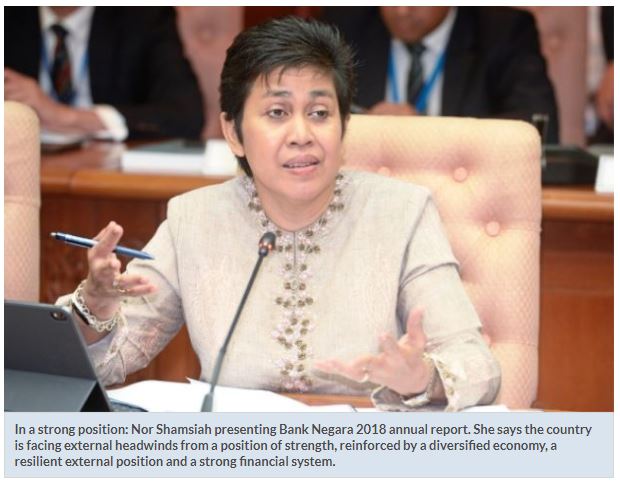Malaysia not entering recession, not suffering deflation
KUALA LUMPUR: Malaysia is neither entering a recession nor is it suffering from deflation, Bank Negara says.
Despite tough economic headwinds, central bank governor Datuk Nor Shamsiah Mohd Yunus asserts, Malaysia is expected to remain on a steady growth path this year, supported by resilient domestic demand. Underlying inflation, on the other hand, is expected to be broadly stable, sustained by steady expansion in economic activity in the absence of excessive demand pressure, she said.
According to Bank Negara’s latest projection, Malaysia’s gross domestic product (GDP) is expected to expand between 4.3% and 4.8% this year. This is a slightly more cautious forecast compared with the 4.9% GDP growth estimated by the Finance Ministry during the tabling of the 2019 Budget last November.
In 2018, Malaysia’s GDP grew 4.7%.
Speaking to reporters at a briefing in conjunction with the release of Bank Negara’s 2018 annual report, Nor Shamsiah noted that the global economy has entered a period of moderating growth this year, with continued volatility in the financial markets.
As a highly open economy with an internationally integrated financial system, she said, Malaysia would not be immuned to these external headwinds.
Nevertheless, Nor Shamsiah stressed, the country is facing these external headwinds from a “position of strength”, reinforced by a diversified economy, a resilient external position and a strong financial system.
“Our baseline assessment of steady GDP growth this year is supported by three factors: resilient private-sector spending, supported by stable income and employment growth, as well as sustained capacity expansion by businesses; recovery in commodity sectors amid continued expansion in key economic sectors such as services and manufacturing; and continued external demand from major trading partners, albeit at a slower pace,” she said.
She pointed out that Malaysia’s well-diversified export structure, in terms of products and markets, would help soften the impact of moderating global growth on external demand.
Overall, domestic demand is expected grow at a more moderate pace of 4.4% in 2019, compared with 5.6% last year. Growth will be driven by private-sector expenditure, which is expected to expand 6.6% this year, while public-sector expenditure is set to decline 1.8% in 2019, as the government continues to rationalise non-critical spending in an effort to consolidate its finances and lower debt.
In the external sector, Malaysia’s trade surplus is expected to narrow to RM114.9bil this year from RM120.5bil in 2018, as export growth is expected to moderate to 3.4% from 6.8%, and import growth to be lower at 4.5%, compared with 4.9% previously.
Of significance, Malaysia’s current account is expected to remain in surplus, albeit narrowing to RM28bil – or 1.5% to 2.5% of gross national income (GNI) – in 2019, compared with RM33.5bil, or 2.4% of GNI.
Meanwhile, Nor Shamsiah dismissed the notion that Malaysia is suffering from deflation, noting that inflation in the country was expected to remain steady at a moderate level this year.
Concerns of deflationary pressure were raised by some quarters after the country registered a decline in headline inflation, as measured by the change in consumer price index (CPI), for the first two months of this year. Data from the Statistics Department showed the CPI fell 0.4% in February, after declining 0.7% in January.
“Let me be very clear, we are not suffering from deflation. Deflation is a situation where there is a broad decline in prices as a result of deterioration in demand, which is not the case for Malaysia, where the price decline is not pervasive,” Nor Shamsiah explained.
“In fact, the recent negative inflation was due mainly to lower fuel prices, while prices of other basket of goods and services continue to rise,” she added.
Nor Shamsiah said moderate inflation rate is needed for a healthy economy.
According to Bank Negara, headline inflation this year is projected to average between 0.7% and 1.7%, compared with 1% in 2018.
The central bank expected inflation to be driven by some cost-pass-through from domestic cost factors, including those arising from policy measures. But this would be offset by the impact of lower global oil prices and the price ceilings on domestic retail fuel prices.
Nor Shamsiah said the central bank would keep the monetary policy accomodative to support Malaysia’s growth amid an environment of relatively low inflation.
On whether there would be an interest cut in the near term to support the economy, she said, the central bank would be on a “data-dependent” mode in deciding the direction of the benchmark overnight policy rate (OPR).
“I must also stress that any adjustment to OPR does not immediately suggest there are risks to growth, as we are not a growth-targeting central bank,” Nor Shamsiah said.
She explained that besides the risks to growth and inflation, Bank Negara would also need to monitor the prevailing monetary and financial conditions in making those decisions.
As for the fiscal policy outlook this year, Bank Negara said the government was expected to continue its pursuit of a gradual fiscal consolidation while lending continued support for growth, paring down debt and liabilities, as well as promoting economic inclusiveness.
Correspondingly, the medium-term fiscal plan outlined the path towards consolidation with fiscal deficit targeted at 3.4% and 3.0% of GDP in 2019 and 2020, respectively.
Last year saw Malaysia’s fiscal deficit widen to 3.7% of GDP from 3% of GDP in 2017.
Bank Negara noted that the government’s path towards fiscal consolidation would be anchored in several key reform initiatives, including enhancing expenditure effectiveness; diversifying and broadening the revenue base; and implementing a holistic and transparent debt management.
Source: https://www.thestar.com.my/business/business-news/2019/03/28/no-recession-no-deflation/#9bsfFZXePUwL7iao.99


 English
English




